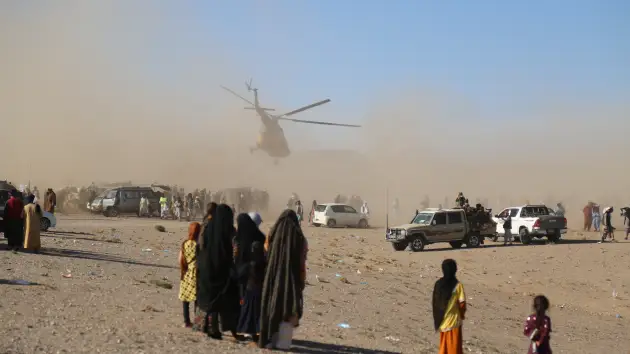Afghanistan has been hit by a second major earthquake in a week, with reports of widespread damage and casualties. The quake, which struck Herat province on Wednesday, was of the same magnitude as the one that hit on Saturday, which killed more than 1,000 people.
The latest earthquake struck at around 05:10 local time (00:40 GMT) on Wednesday, 28km (17 miles) north of the city of Herat. It was felt across much of western Afghanistan, and as far away as Kabul.
The full extent of the damage is still being assessed, but reports suggest that hundreds of homes have been destroyed and thousands of people have been displaced. The United Nations Office for the Coordination of Humanitarian Affairs (OCHA) has said that at least 100 people were injured in the quake and that the death toll is expected to rise.
Humanitarian response in Afghanistan
The Afghan government and aid agencies are working to provide assistance to those affected by the earthquake. However, the response is hampered by the country’s ongoing humanitarian crisis and the Taliban’s rule.
The United Nations has appealed for $110 million to help fund the response to the earthquake. The money will be used to provide food, water, shelter, and medical assistance to those affected.
Challenges in Afghanistan
The humanitarian response to the earthquake is facing a number of challenges, including:
- The country’s ongoing humanitarian crisis: Afghanistan is already facing a severe humanitarian crisis, with millions of people in need of food, water, and shelter. The earthquake has further exacerbated this crisis.
- The Taliban’s rule: The Taliban’s rule has made it difficult for aid agencies to operate in Afghanistan. The Taliban has imposed restrictions on aid workers and has limited access to some areas of the country.
- The remote location of the affected areas: Many of the areas affected by the earthquake are remote and difficult to access. This is making it difficult to get aid to those who need it most.

The earthquake in Afghanistan is a tragedy for the country’s people. The full extent of the damage is still being assessed, but it is clear that the need for humanitarian assistance is great.
The international community must come together to support the Afghan people in their time of need. Aid agencies need to be given unrestricted access to the affected areas and the Taliban must cooperate with the humanitarian response.
Additional information
In addition to the challenges listed above, the humanitarian response to the earthquake is also facing the following challenges:
- Damage to infrastructure: The earthquake has damaged roads, bridges, and other infrastructure, making it difficult to transport aid supplies and personnel to the affected areas.
- Lack of resources: The Afghan government and aid agencies are already stretched thin due to the country’s ongoing humanitarian crisis. The earthquake has put additional strain on their resources.
- Security concerns: Afghanistan is a volatile country with a high level of insecurity. This makes it difficult for aid workers to operate safely.
Despite the challenges, the humanitarian community is working tirelessly to provide assistance to those affected by the earthquake. Aid agencies are distributing food, water, shelter, and medical supplies. They are also working to repair damaged infrastructure and to provide psychosocial support to those who have lost loved ones.
What can you do to help?
There are a number of things you can do to help the Afghan people in their time of need:
- Donate to a reputable aid agency: Aid agencies are working on the ground in Afghanistan to provide assistance to those affected by the earthquake. You can donate to help fund their work.
- Raise awareness of the situation: Spread the word about the earthquake and the need for humanitarian assistance. You can do this by talking to your friends and family, sharing information on social media, and writing to your elected officials.
- Advocate for the Afghan people: Call on your elected officials to support the Afghan people and to ensure that they have access to the humanitarian assistance they need.
Conclusion
The earthquake in Afghanistan is a tragedy for the country’s people. The full extent of the damage is still being assessed, but it is clear that the need for humanitarian assistance is great.





